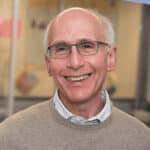
Lee Rubin, PhD
Principal Faculty, Harvard Stem Cell Institute (HSCI)
Professor of Stem Cell and Regenerative Biology, Harvard University
Co-Chair, HSCI Nervous System Disease Program
Bio
Dr. Rubin investigates neurodegenerative diseases, with the ultimate goal of finding effective therapeutic candidates to treat them. He has broad experience in translational neuroscience acquired in both biotech and academia. At Harvard, Dr. Rubin’s work has focused on discovering therapies for neurologic diseases such as Parkinson’s disease (PD), amyotrophic lateral sclerosis (ALS), and spinal muscular atrophy (SMA). Recently, his lab has been pursuing two main projects: the regeneration of the neuromuscular system and stimulating rejuvenation of the aging brain,
Earlier in Dr. Rubin’s career, his lab investigated the cell biology of the blood-brain barrier (BBB), leading to the discovery of the multiple sclerosis drug Tysabri. Subsequently, his laboratory discovered the first small molecule activators and repressors of a crucial cell pathway, hedgehog, involved in many diseases. One of these repressors was further developed by Genentech and is now approved as a treatment for metastatic basal cell carcinoma. One of the activators is now widely used by stem cell scientists to turn stem cells into various types of brain cells.
Dr. Rubin received his Ph.D. in neuroscience from the Rockefeller University and completed his postdoctoral training at Harvard Medical School and Stanford University School of Medicine.